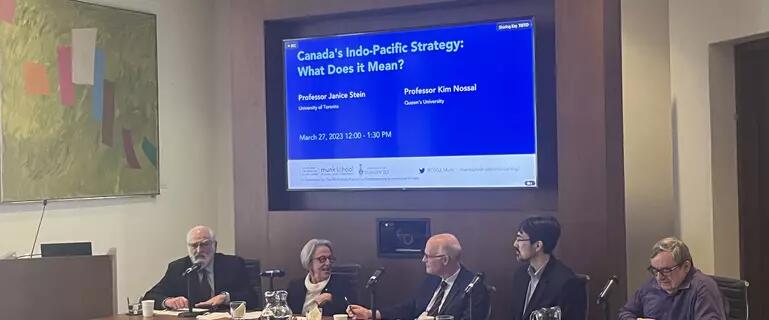
Event Report: Canada's Indo-Pacific Strategy: What Does it Mean?
On March 27th from 12:00 pm to 1:30 pm (EDT), an expert panel gathered to discuss Canada's recently published Indo-Pacific strategy. The panel featured two distinguished speakers with extensive knowledge and experience related to Canadian foreign policymaking. The first panelist was Janice Stein, founding Director of the Munk School of Global Affairs & Public Policy and co-chair of the government's Indo-Pacific Advisory Committee. The second panelist was Kim Nossal, a Queen's University political scientist and leading expert on Canadian foreign policy.
The event opened with remarks from John Meehan, the Director of the Bill Graham Centre for Contemporary International History and Phillip Lipscy, Director of the Centre for the Study of Global Japan. Lipscy opened the event by asking the panel to explain what they believe the significance of the Indo-Pacific Strategy is and how it will shape Canadian relations with countries in the region. Nossal responded by articulating how significant this shift in Canadian foreign policy is and how we must understand the document due to the Trudeau administration's ambitions to strengthen Canadian diplomatic influence, evidenced by speeches delivered by Deputy Prime Minister Chrystia Freeland and Foreign Minister Mélanie Joly. Nossal observed that the document reflects unprecedented Canadian support for the American-led rules-based international order. He noted that the language used to describe China in the document was remarkably forthright, signaling that Canada is now primarily focused on strengthening affairs with countries like Japan and South Korea.
Stein answered the question by reminding the audience that the Indo-Pacific strategy was released in stages and how significant foreign policy shifts in Beijing and Washington provided Canada with the necessary context and impetus to clarify its diplomatic priorities. Stein noted that Canadian public and elite opinion had shifted in response to the Chinese detainment of the "Two Michaels" and other evolving challenges. The economic and geopolitical importance of the Indo-Pacific region has increased drastically, significantly impacting the parameters of Canadian policymaking. Stein also credited former Japanese prime minister Abe Shinzo for being an early advocate for a Free and Open Indo-Pacific and shaping thinking toward the region, including in Canada.
Professor John Meehan then asked the panelists to offer their opinions of Canada describing China as an "increasingly disruptive global power" in the Strategy and how the shift of Canadian strategy from 'engagement' to 'containment' with China will impact relations. Stein responded by stating that China's status as a disruptive power is "not new" and directed the audience's attention to the 4 C's present in the Indo-Pacific Strategy- collaborate, compete, contain, and confront. The 4 C's, however, can come into contention with economic prosperity, with Stein noting that although relations between the United States and China are strained, trade between the two nations has actually increased in the past two years: "friend-shoring" is not all that it is made out to be.
Nossal followed up by focusing on historical Canadian public opinion towards China, noting that Canadian views towards the country soured after Xi Jinping took office. Nossal observed that it is essential to note that the majority of other Western nations have followed a similar trajectory: the evolution of Canadian policy is part of larger global shift. He also argued that Canada needed a nuanced approach towards China that balanced commitments towards allies with economic objectives.
The remaining questions asked of the panel revolved around if there is a distinctive 'Canadian' approach to the Indo-Pacific region, Canada's response to the changing security landscape of the region, and recent reports suggesting that Canada could be seeking a "Quad"-like diplomatic framework with Japan, South Korea, and the United States. We would like to thank the panelists for their trenchant analysis and the large and engaged audience that was in attendance for this event. The Centre for the Study of Global Japan would also like to thank the Bill Graham Centre for Contemporary History for their co-sponsorship of the event.
A full recording of the event can be viewed here.

